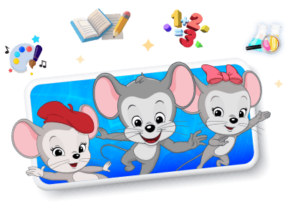
What Is Homeschooling with Unit Studies?
Find out about this immersive approach to learning and how to add it to your homeschooling approach.
Homeschooling offers families the flexibility to tailor their child’s education to their needs and interests and explore a variety of approaches to teaching. One popular approach within homeschooling is the use of unit studies, which provides a comprehensive and immersive learning experience.
Homeschooling with unit studies encourages students to dive deeply into a specific topic by incorporating multiple subjects, such as science, history, and language arts, into the study of that topic. Homeschooling with unit studies is often thought to provide children with an engaging and dynamic experience due to the variety of deeper-level learning that occurs.
Tip: ABCmouse covers a variety of skills and key educational subjects, providing home educators with an additional resource for supporting deep-dives into various topics.
What are Unit Studies?
A unit study, sometimes called thematic units or integrated studies, is an educational approach that focuses on one particular theme or topic for a period of time and incorporates multiple subjects of study into the topic. Unit studies can include just about any topic, from musical composers to space travel to geography.

Unit studies allow students to fully engage with a given topic by exploring it through different core subjects, helping them hone their math, reading, and science skills while digging deeper into a subject. Exploring a topic from different angles can help children retain information and increase their interest in learning.
Children often appreciate the variety of activities that come with unit studies, from reading books and watching videos to field trips and experiments. Since children are often involved in picking the topics of study, they typically enjoy the more extensive learning that accompanies unit studies.
What Does Homeschooling With Unit Studies Look Like?
Homeschooling provides the ideal opportunity to work with unit studies because families can choose exactly what topics they’d like to study, how long they want each unit to last, and what subjects they’d like to tie into the unit. A unit study can last anywhere from a few days to several weeks, depending on how deeply a homeschooling family wants to examine the topic and what they want to incorporate into the unit.

If your child is learning about the solar system, a unit studies approach brings that topic into various subjects and activities. For example, you could start by teaching your child about the planets, their characteristics, and their position in relationship to the sun. In science, your child could conduct experiments to understand gravity.
Math could involve calculating the distances between planets, and language arts could include researching and writing about space exploration. Bring art into the mix by having your child create a model of the solar system for art. Add in hands-on activities with a field trip to a local planetarium and backyard evening excursions to chart how the stars and planets shift over the course of several weeks.
Benefits of Unit Studies in a Homeschool Curriculum
There are many benefits to using unit studies in a homeschool curriculum. Here are just a few of them.
Engagement
Unit studies provide an immersive, hands-on approach to learning and often include conducting experiments, going on field trips, and working on creative projects. This type of learning can be more engaging for students that prefer variety in their learning, especially if they’ve helped select the topics of study.

Integrated Learning
Because unit studies integrate multiple subjects into a central theme or topic, students can make connections between different disciplines and learn about a topic through various perspectives and approaches. This can help grow a deeper understanding of the subject matter.
Flexibility
The pacing of unit studies suits the homeschooling family well. A homeschool unit study can span anywhere from one week to four weeks or beyond. This flexibility allows home educators to adapt lesson plans and curriculum to meet their child’s interest in the unit.
Long-Term Retention
Due to the immersive nature of unit studies, children may be more likely to retain the knowledge and skills they acquire during the unit.
5 Ways to Bring Unit Studies Into Your Homeschool
When incorporating unit studies in a homeschool curriculum, planning is key, as this immersive approach often requires more in-depth lesson plans for longer courses of study. Here are a few tips to help you start homeschooling with unit studies.
- Choose a topic
Because unit studies explore topics thoroughly, it’s important that they interest your child. It can also be helpful to narrow down your topic when lesson planning so it’s not too broad. For example, if your child likes animals, narrow the focus to zoo animals, or if they choose cooking, zero in on a specific part, like baking desserts or French cooking.
- Identify learning objectives
What does your child want to learn about this specific topic? What skills do you want your child to learn or practice? Incorporate these items into your curriculum. Make sure that your learning objectives cover a wide range of subjects–from math to reading to critical thinking and writing.
- Plan activities
What activities or resources will you be using? Will you head to the library to check out books or biographies, search for videos or documentaries, perform experiments, use online curriculum, go on field trips, or make art projects? Make sure you have all of your resources at the ready before you begin.
- Incorporate different subjects
Use what you are learning to introduce other subjects, and try to include as many subjects as possible throughout your curriculum. This can sometimes require creative thinking!
- Evaluate your child’s progress
Before you begin, make a list of goals you would like your child to accomplish through the unit study. As you go, try documenting what your child has accomplished in each subject and what they need further practice with.
Tip:
Remember that you don’t have to create every part of your unit study yourself. While it’s fun to plan your own curriculum, there are other helpful tools that you can use to supplement your study.
Support Your Homeschool with ABCmouse and Adventure Academy
Our digital learning programs are designed by curriculum experts to assist your homeschool and children ages 2 through 13. ABCmouse is a comprehensive online educational platform for children ages 2-8, while Adventure Academy focuses on children ages 8-13. Both programs provide access to lessons on reading, language arts, math, sciences, social studies, and more. Learn more about how each program can enhance your homeschool below.
ABCmouse and Homeschooling
ABCmouse offers over 10,000 learning activities and more than 850 lessons for children, plus a large digital library of books and educational puzzles, songs, activities, and worksheets. The program encourages self-paced learning with motivating rewards and includes progress tracking, which allows home educators to monitor time spent on certain subjects and the number of activities completed.

Then just $14.99/mo. until canceled
As a paid add-on to regular subscriptions, home educators can access the Assessment Center, which allows parents and caregivers to test children on their knowledge, determine successes and struggles, and receive recommended lessons based on assessments.
ABCmouse provides a robust curriculum that can supplement other early learning lessons. It’s trusted resource that’s been downloaded over 10 million times and has a 4.5-star average out of 831.4K ratings.
Adventure Academy and Homeschooling
Adventure Academy combines an interactive world with a curriculum covering reading, language arts, math, science, and social studies. With quests, games, and educational videos and activities, learning becomes an epic journey that motivates kids to explore various topics.
For homeschooling families, Adventure Academy offers an engaging, flexible learning experience that can supplement other educational materials. The program features thousands of activities created by curriculum experts and covers all major academic domains.
Parents and caregivers can choose academic difficulty levels and track each child’s progress, seeing time spent in Adventure Academy, activities completed, and subjects studied.
Adventure Academy emphasizes key topics such as reading comprehension, vocabulary development, mathematical operations, fractions, world geography, American history, physical science, life science, earth science, and scientific inquiry.
For more information, visit AdventureAcademy.com.
More from ABCmouse:
-
A Parent’s Guide to Play Based Learning
Discover the joys of play-based learning with our Parent’s Guide. Learn how it benefits language, social skills, and creativity in children from infancy to elementary. Engage…
-
2nd Grade Spelling Words
Discover engaging activities for second-grade spelling practice with our extensive lists, including vowel teams, r-controlled vowels, prefixes, and more. Free printables included for easy learning at…
-
What is Phonics, and How Do I Teach It? A Guide for Parents
This guide from ABCmouse was written using insights from our educational experts to help parents and caregivers understand what phonics is, the important role it has…
-
1st Grade Spelling Words
Explore effective strategies for teaching first grade spelling with our comprehensive guide. With many free printable list of essential 1st grade spelling words your first grader…
-
How To Prepare Your Child for Kindergarten
Prepare your child for kindergarten with ABCmouse’s checklist guide: Establish routines, enhance social skills, foster academic prep, and ensure emotional readiness for school. Learn more about…







